Table of Contents
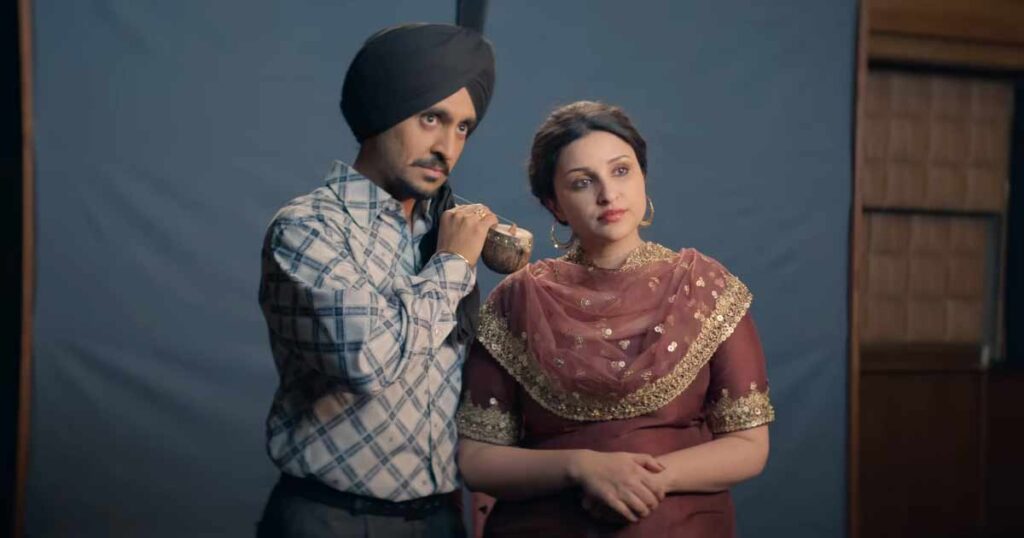
Director: Imtiaz Ali
Writers: Imtiaz Ali, Sajid Ali
Cast: Diljit Dosanjh, Parineeti Chopra, Anjum Batra, Apinderdeep Singh, Anuraag Arora, Udaybir Sandhu
Streaming On: Netflix
For the longest time, we were fed a regular staple of biopics, but finally we have got a biopic that feels like a layered retelling of a folklore.
In many ways, the narration and the screenplay of ‘Amar Singh Chamkila’ is purposefully crafted in a way that tells the eponymous performer’s story as it deserves to be told — by the people who loved him, who saw him rise and the ones who also wished to see his fall from grace.
The first song in the film portrays how this story is going to unfold — through the legend of Chamkila.
The flashback style of story narration is exactly how most people will hear about or get to know about Chamkila. It will be often told by their family, friends or acquaintances as a folk tale about an artist who enjoyed success beyond the shackles of politics, censorship and societal rules, which ironically is what killed him in the end.
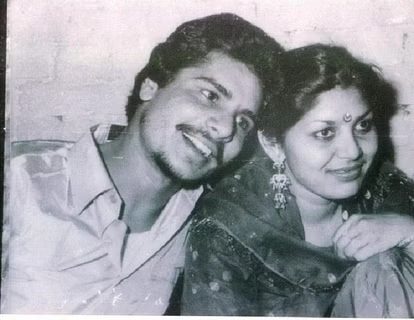
The 27 Club
Chamkila, often regarded as Punjab’s Elvis Presley, is a part of the 27 Club. The ’27 Club’ refers to the unfortunate phenomenon where several influential musicians and artists, including Janis Joplin, Jimi Hendrix, Jim Morrison, Kurt Cobain, Amy Winehouse and now Chamkila, all passed away at the age of 27. While there is no direct correlation between these individuals other than their age at the time of death, their untimely demise has sparked discussions about fame, fortune, artistic genius and the pressures that come with it.
Who killed Amar Singh Chamkila?
Chamkila’s inclusion in the 27 Club further solidifies his status as a legendary figure in the world of Punjabi music. Despite his premature death, his music continues to resonate with audiences worldwide, and he remains a beloved and revered figure in the realm of Punjabi folk and pop music.

Chamkila, along with his wife and two members of his band, was gunned down in Jalandhar, Punjab, on March 8, 1988. The assailants, reportedly unidentified, opened fire on them while they were in their car.
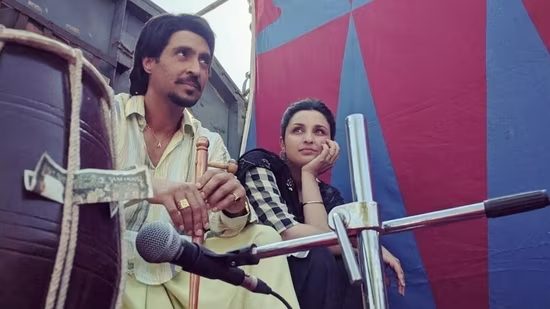
There have been various speculations and theories regarding the motive behind the killings, ranging from personal vendetta to political tensions in the region. However, despite investigations and inquiries, Chamkila’s death remains shrouded in mystery, as the case has not been conclusively solved.
Chamkila’s assassination shocked the Punjabi music industry and left a significant void. His unique style and lyrical prowess continue to influence Punjabi music even decades after his death. Though the circumstances of his death remain unresolved, his legacy as an iconic figure in Punjabi folk and pop music endures.
The artist and his art
Chamkila’s crude, suggestive lyrics gained him a large fan base, but also drew criticism from both fundamentalists and those responsible for upholding societal norms and laws.
However, Chamkila’s sole aim was to cater to his audience’s preferences with his voice. He understood his audience so well that creating content they enjoyed came naturally to him.
During a troubled period in Punjab’s history, Chamkila focused on spreading joy. It’s a beautiful thing to witness, akin to a global phenomenon. For example, I recall how Dua Lipa’s ‘Future Nostalgia’ album lifted my spirits during the Covid lockdown, providing solace and motivation during a time of global distress. An artist’s dedication to their craft can lift even the most despondent spirit. At one point in the film, a music label owner (played by actor Kumud Mishra) tells Chamkila, ‘Jab duniya mein tanaav badhta hai, tab junta ke andar entertainment ki bhookh aur bhi badh jaati hai’, in effect, persuading Chamkila to keep doing what he does best.
Legend has it
At a performance venue in Canada, Amitabh Bachchan’s appearance led to the addition of 137 extra seats. Few days later, when Chamkila went to perform in the same venue, the demand soared and the presenters had to add over a thousand seats to accommodate the audience rushing in to see him perform.
A tale told in layers
Director Imtiaz Ali, along with his brother and writer Sajid Ali, layers the narrative skillfully. Each layer paints a vivid picture for the viewer, drawing from personal accounts of those who knew Chamkila closely. It’s fascinating to see how different people, such as colleagues and family members, perceive the same events differently, adding depth to the story.
While not all contributors during the pre-production were entirely truthful, their perspectives add weight to the narrative, despite the quirks of memory. This mosaic of viewpoints sheds light on an artist who remains enigmatic even after his passing as both a folk legend and a musical icon. The movie is equal parts a fable and a tale about a musical icon; a man so mythical that he continues to haunt the culture of the land long after his passing.
Another thing that I appreciate about Amar Singh Chamkila is its stylistic editing and overall presentation. There are several scenes where you see the reel and real life Chamkila and Amarjot on the screen, you see the lyrics of Chamkila’s original songs translated in Hindi and presented like a lyrical video. There are still photos from concerts and events, flashbacks, animations of several real life incidents. If not handled or edited well, this style of filmmaking can come across as chaotic, but here the chaos is controlled and presented in a way that helps the audience gauge the mood and setting of the film or a particular scene better.
The editor, Aarti Bajaj, who has worked on several films with Imtiaz Ali in the past, has done a fabulous job of stringing the events together along with the variety of ways these scenes are presented in.
Fitting music for narrating a musical icon’s journey
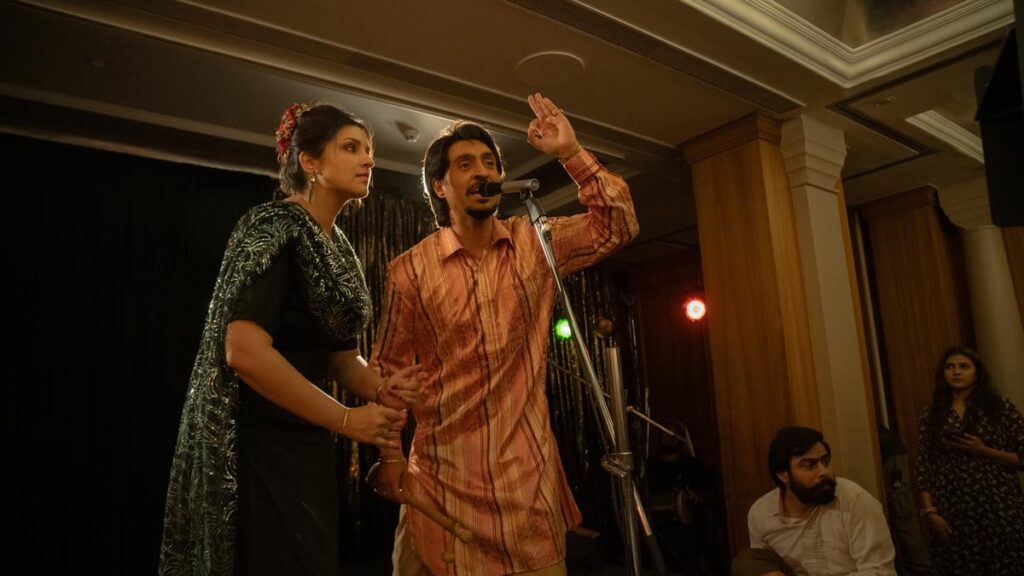
As a viewer, you’re not just presented with a straightforward tale of an icon; the film’s original songs, performed live by Diljit Dosanjh and Parineeti Chopra, along with A. R. Rahman’s score and Irshad Kamil’s lyrics, offer insights into both the audience’s desires and Chamkila’s perception.
The film’s soundtrack is intertwined with its story, each song a poetic expression of what the character is experiencing. Imtiaz Ali, known for his mastery in this aspect, delivers another distinctive soundtrack with Amar Singh Chamkila, evoking a range of emotions and flavors that add a layer to the storytelling. Tracks like “Baaja” and “Vida Karo” capture the essence of Chamkila’s journey, from the whispers of fame to the solemnity of his final rites.
Trivia
Vida Karo, an earnest goodbye to Chamkila and Amarjot, was written and composed by Kamil and Rahman, in under an hour. The latter lit his Mumbai studio with candles and lamps to create an environment that ultimately helped the duo give this song the sincerity it deserves.
One standout track, “Naram Kaalja“, showcases Chamkila’s diverse female fan base singing “chamkila mere andar bhi bole sada” which is indicative of how even the women (secretly) enjoyed the songs Chamkila wrote about them, despite the provocative nature of some of his compositions. It’s intriguing to see rural Indian women play these playful, often bold, tunes during festivities like haldi or sangeet, where they serve as entertainment and foster camaraderie, reflecting a whole culture that might seem a little inappropriate now.
This musical hits all the right notes
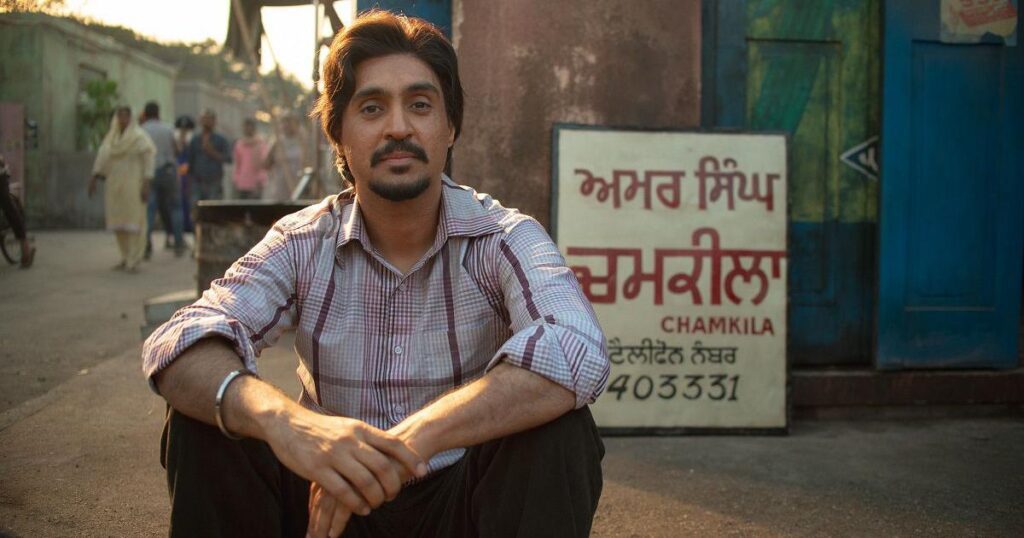
Like any other great artist, Chamkila attracted admiration and jealousy alike. When the writer and filmmaker open the doors to take in all of these feelings attached to the artist, it leaves a trail of an interesting portrait of a man heavily misunderstood by the world. Right from friends and rivals to police and even religious leaders, everyone has a Chamkila story to tell.
Amar Singh Chamkila works best as a celebration rather than a deep dive into the life of a musical superstar. I’m grateful to Imtiaz Ali for making and presenting this film the way he did.
Catch the biopic on Netflix for its innocence, honesty and sincere depiction of a musical legend’s outstanding contribution to pop culture.
Glossary
Word: Haldi
Meaning: A vibrant and joyous pre-wedding ritual observed in Hindu marriages applied to the bride and groom’s skin as a form of blessing, symbolizing purification, protection from evil spirits and enhancing their glow for the upcoming wedding festivities.
Word: Sangeet
Meaning: A celebratory pre-wedding ceremony which brings together both the bride’s and groom’s families to celebrate the union of their loved ones, like a rehearsal dinner.